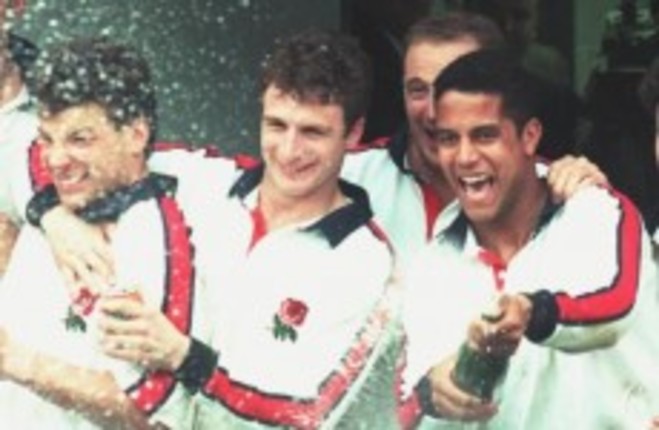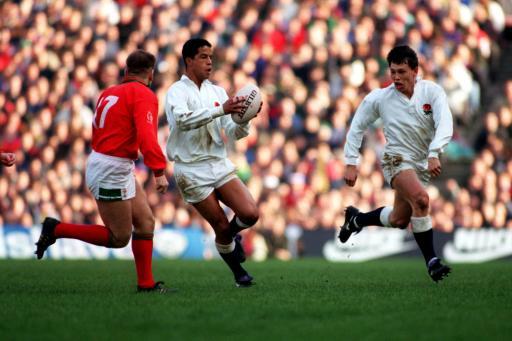“I CAME FROM a successful team with Bath so every time I took the field with them or England, I expected to win.”
It kind of gets a bit forgotten today since Clive Woodward’s England side won the 2003 World Cup, but the players who wore the Red Rose a decade earlier were just as dominant.
Let’s compare their CV’s. Woodward’s England won three Six Nations titles (one of which was a Grand Slam) and the World Cup. The England side of Jeremy Guscott, Will Carling and Brian Moore won three Grand Slams, made a World Cup final and captured another Six Nations title (although by then the transition had begun to the team that eventually won the World Cup).
The main reason Irish rugby fans hate the English team (for the most part) is because of how dominant the side was in the early 90′s, at a time when Ireland were going through a barren spell.
Not only did England win Grand Slams in 1991, 1992 and 1995 but they were narrowly defeated in 1990 and 1994 (Simon Geoghegan’s try) too.
Dazzling centre turned BBC pundit Jeremy Guscott was an ever-present in that great England team and it is his quote that begins this article.
He broke into the England team in 1989 and after a Lions series win in Australia that summer, he was ready to nail down his place in the national team. He came into the side around the same time as fellow backs Will Carling and Rory Underwood and the trio would be key contributors to England’s success over the next ten years.
But before they could experience success, they first had a taste of failure and heartbreak. They travelled to Murrayfield on the final day of the Five Nations in 1990 for a Grand Slam decider and were favoured to beat Scotland. Even before the game kicked off Guscott knew the Scots were up for it.
“I remember walking beside them in the tunnel and they were in a different zone,” Guscott told The42.
“They didn’t act any different but they definitely looked different. We were the favourites but they were a good side too and had a lot of Lions. I don’t think we were overconfident that day, I just think we were beaten by the better team.”
That game is one of the most famous days in the history of Scottish rugby but it is remembered in English rugby too for what followed – England would lose just three games in their next five campaigns.
Guscott thinks that loss at Murrayfield had a profound impact on the England side and helped drive them on to their success in the years after.
“I think everyone on that English team would say that the fear of losing we all had was far greater than the joy we got from winning,” Guscott said.
“I think a lot of great teams have that.”
1991 was a huge year for English rugby because there was a home World Cup at the end of it. But before they could consider winning that tournament, they wanted to win their first Grand Slam in over ten years. For the second straight season it came down to a final day decider but this time France were the opposition at Twickenham.
England were favoured once again but when current French coach Philippe Saint-Andre finished off this audacious wonder-try that was launched in their own dead ball line, it looked like the English would get floored with another haymaker.
As the man who made a despairing dive to catch the flying Frenchman, Guscott remembers the try well.
“I will tell you what went through my head when Phillipe Saint-Andre scored that try – his studs,” Guscott said.
“I saw Serge Blanco breaking and I stepped out of the line because I didn’t think Rob Andrew would get him. I ended up making a pathetic dive at Saint-Andre to make it look like I could tackle him and he caught me in the face with his stud.”
England were able to regroup and eke out a win to seal the Grand Slam and Guscott thinks the experience of the previous year stood to the group. His mentality after the game also gives an insight into how England were able to maintain such a high level of consistency at that time.
“A good side doesn’t believe a game is lost until it actually is,” Guscott said.
“The first feeling I felt at the final whistle was relief. There was a bit of joy – I was looking forward to going out on the lash because we could back then – but then I was thinking about the next game. I was thinking, ‘I’m back in work on Monday and what’s the next game’.”
The World Cup was next up for England and despite losing a pool game to New Zealand, England were able to bulldoze their way past France and Scotland to make the final against Australia. Famously, England then abandoned the forward-orientated power game that brought them to the decider in favour of a more expansive style and were beaten by the Australians.
Guscott thinks that defeat is what stops his England side being put in the same bracket as Woodward’s World Cup winners.
“It’s because they won the ultimate prize and did it very well,” Guscott said about why his England side aren’t rated as highly despite winning three Grand Slams.
“They were ranked number one in the world, which we never were. Even going into that World Cup I’d say we were probably only ranked three or four. I enjoyed every moment of that World Cup up until the final, where we changed our game plan and lost. But we got a lot of recognition at the time for that so I don’t think we were undervalued.”
The reason people were so surprised that England would move away from their strength in that final was because of how many bruisers they had in the pack. Brian Moore, Dean Richards and Mike Teague were three of the toughest players in rugby at the time and loved nothing more than levelling an opponent, either with a tackle or a punch.
Exhibit A – the 1989 Lions tour (Richards is 8 and Teague is 6).
As a skillful back, Guscott was thankful for the protection that his tigerish pack provided for him and enjoyed their company off the pitch too.
“England always produce decent packs. A poor England pack will make the side reasonably competitive,” Guscott said.
“A great England pack will win the World Cup or come very close like we did in 1991. I felt more affinity with the forwards and hung around with those guys more. I roomed with Rory Underwood and he was a teetotal. I was the opposite so I’d often join the forwards for some refreshers after a game.”


